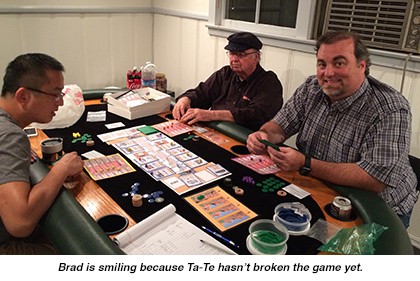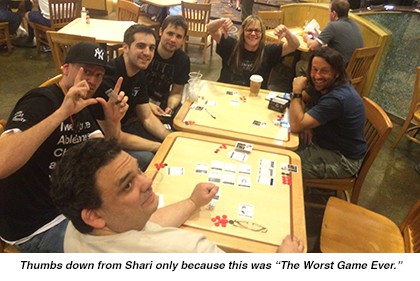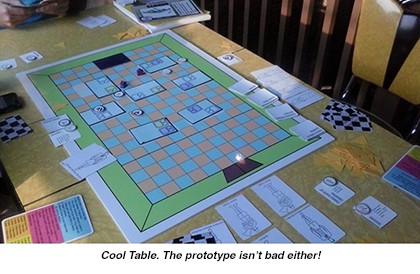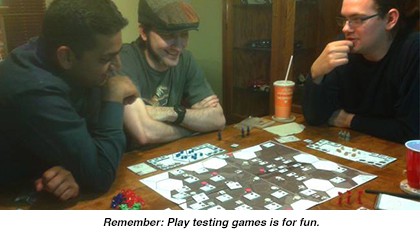
Guest post by Pete Butler-Davis.
From Jasmine: As game designers, my husband Pete and I have been in a position to receive a LOT of feedback – some good, and some very, very bad. We’ve also played a lot of prototypes, and learned a thing or two about how to offer feedback. Pete had some thoughts on offering feedback in a way that’s constructive, useful, and takes into account the most important thing about game designers – we’re people, too!

PLAYING OTHER DESIGNS
If you’re designing games, you need to play games. And as long as you’re playing games, why not play some prototypes when the opportunity arises? Seeing how other people approach the challenge of creating a fun game can inspire and inform your own work.
When you’re done playtesting a stranger’s game, one of the first things they’re liable to ask is some variant of “So, what did you think?” This simple question is a minefield.
Most people are accustomed to getting bland variations of “It was very nice!” When they hear honest feedback from somebody who has no particular reason to spare their feelings, it can be more than a little jarring, even when it’s what they’re explicitly looking for.
HOWEVER, NEGATIVE FEEDBACK IS THE MOST IMPORTANT FEEDBACK.
A game designer will likely do more to improve their game by fixing the broken bits than they will by polishing the stuff that already works. It is, unfortunately, the most difficult feedback to hear. When you spend a lot of time creating something, you tend to get personally invested in it. Hearing bad things about something you’re invested in is no fun at all, and it can be difficult to come away with useful information.
To a large extent, it’s up to the person getting the feedback to deal with that problem, to overcome the irksome ego that wants to shout down every criticism. If they haven’t developed those skills at all – if they’re going to argue that their game is perfect down to the font selection – there’s not a hell of a lot you can do. But if you’re the one delivering the feedback to somebody who isn’t a hopeless lost cause, there are things you can do to make their job easier.
And we’ll start with the bedrock, underlying principle:
RULE 0: LISTENING TO NEGATIVE FEEDBACK ON SOMETHING YOU CREATED IS REALLY, REALLY HARD.
If you have never experienced this truth for yourself, take it on faith. Do not forget this rule. I have forgotten this rule. Forgetting this leads to acting like an ass. People do not appreciate it when you act like an ass. Trust me.
1. ASK BEFORE YOU DIVE IN.
If the creator has specifically requested feedback, by all means, start rolling. But if they haven’t, make sure they’re actually interesting in hearing what you have to say. It’s possible they’ve already gotten all the honest feedback they can handle today. (And if the amount of honest feedback they can handle any given day is “none whatsoever,” well, hey, they at least have my kudos for knowing themselves. And my condolences on a game likely doomed to permanent mediocrity.)
2. ALWAYS MAKE SURE YOUR NEGATIVE FEEDBACK IS CONCISE AND TO THE POINT.
Do not make it witty. Do not use hyperbole. Witty, hyperbolic snark is for the Internet. It is not for a face-to-face conversation with the actual creator. Yes, this will likely make your criticism very, very boring for a general audience if you were to post it on Reddit. You are not posting to Reddit for a general audience. You are telling somebody that the project they’ve spent God knows how much time and energy crafting has major pieces that just didn’t work for you. Boredom will likely be the furthest thing from their mind.

3. WHEREVER POSSIBLE, USE “I” STATEMENTS.
These are your opinions; present them as such. (Again, boring on Reddit; again, who cares.) The game is not boring; you found it repetitive. The graphic design is not a confusing hodge-podge of misused clip art; you found the graphic design challenging, and you have some concerns about the use of what you suspect is clip art.
REMEMBER, YOU ARE NOT THE FINAL ARBITER ON A GAME’S QUALITY.
If the creator hears “I was bored” from a significant percentage of the people who played it, they’ll (hopefully) get the picture. But if you’re one of only a few people making that complaint, then perhaps the game simply wasn’t for you. That’s for the creator to figure out.
4. CRITIQUE THE GAME, NOT THE CREATOR.

No matter what unflattering insights you feel this game has given you into the creator, keep them to yourself. Keep your focus on the product in front of you. Do not say that the creator really needs to seek help for their obsessive-compulsive disorder; say that you found the rules too finicky to be enjoyable. Do not say that the creator clearly has a massive problem with women/Christians/whoever; say that the way the game presented women/Christians/whoever kept you from enjoying yourself.
When somebody invests themselves heavily in a creative project, criticisms of that project can easily wind up feeling like personal attacks. Don’t compound the problem with actual personal attacks. (Unless you’re completely dismissing the creator as a loathsome jerkface, and are just plain giving up on the notion of constructive feedback. But if that’s the case, this article’s already pretty useless to you.)
5. IF YOU SEE A FIX, DESCRIBE THE PROBLEM, THEN SUGGEST A SOLUTION.
Don’t just leap directly to “You need to make the sheep cost two gems instead of four!” All you’re doing is informing the creator of how you would have designed the game. Which is nice and all, but not terribly useful.
THE MOST USEFUL INFORMATION IS THAT SOMETHING IS BROKEN, SO MAKE SURE YOU COMMUNICATE THAT FIRST.
“The economy felt really stifled to me; it seemed like sheep were a huge bottleneck.” Then, once you’ve established what you think was broken, you may suggest a fix.
Suggesting a fix is always optional. “If you’re so smart, why don’t you fix it!” is the pitiable wail of a wounded ego throwing a tantrum. Ignore it and politely end this conversation, as it’s a waste of everybody’s time. Either the creator’s ego needs a rest before it can handle any more punishment, or the creator needs to improve their ego-management skills. Neither will happen in the next five minutes.
The creator may find your fix useful. Or useless. Or they may use it as a stepping stone to something they like better. (“Hmm, perhaps if the sheep cost three gems and also came with a carton of cigarettes….”)
TL;DR
Be honest without being a jerk, and remember both that you could be wrong and that being right really doesn’t matter if they’re not ready to hear it.
Now go find something awesome and have fun playing it.









